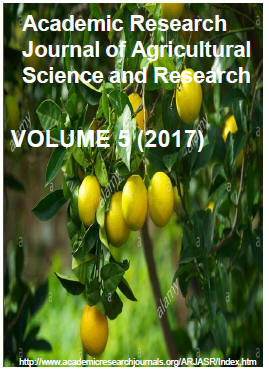| ARJASR |
Academic Research Journal of
Agricultural Science and Research |
||||||||||||||||||||||
|
Academic Research Journal of Agricultural Science and Research Vol. 5(3), pp. 230-243. May, 2017. ISSN: 2360-7874 DOI: 10.14662/ARJASR2017.023 Full Length Research
Dynamics of native and introduced rhizobia
under different cropping sequences and soil fertility levels in a Siaya
County, Kenya
To address
the problem of decreasing food production and livelihoods resulting from
declining soil fertility in Kenya, the conservation and sustainable use
of soil micro organisms is critical. To realize this purpose, effective
and infective commercial rhizobial inoculants have been evaluated and
identified. However, the absence or presence of infective indigenous
rhizobia in soils requires to be demonstrated alongside effective
commercial inoculants under different cropping sequences, seasons and
inoculation regimes. We therefore laid out a completely randomized block
design in four replicates in soils of low indigenous rhizobia with 7
cropping sequences and a selected strain of commercial B. japonicum
(532c) for four seasons. The initial soil characterization revealed that
the soils were low in native rhizobia (CFU g-1 soil), confirming the
need for current interventions by this study. During the short rain (SR)
2014 season, data revealed significant increase in nodulation in the
inoculated plots when compared to the uninoculated plots. There was a
drastic seasonal increase in nodule weight under the uninoculated mono
soybean, an indication of buildup of the native rhizobia with the
presence of the host legume. Polymerase Chain Reaction-Restriction
Fragment Length Polymorphism (PCR-RFLP) analysis distinguished 3
intergenic spacer groups (IGS) denoting low diversity of the native
rhizobia able to nodulate soybeans under these conditions. The IGS I
corresponded with that of the commercial inoculant applied while IGS II
and III were dominant in the uninoculated treatment demonstrating the
competitive competence of the indigenous rhizobia. The distribution of
the different IGS groups within the experiment was more affected by
season, cropping system and treatment (inoculated or uninoculated)
rather than site. IGS group II and III had almost similar proportions of
nodule occupancy in the first season under the uninoculated sequences.
However, with season IGS II predominated indicating its possible
adaptation to the local conditions and hence better competitive ability.
We conclude that the use of promiscuous soybean varieties in soils with
some background rhizobia will increase nodulation and rhizobia diversity
as the host legume is included in the cropping sequence. There is need
for extensive agro ecological zone evaluation since the native strains
could be site specific. Characterization of total bacterial diversity
and evenness in the study site is equally recommended How to cite this article: Mwiti ME, Ng’etich W, Okalebo R, Thuita M, Masso C (2017). Dynamics of native and introduced rhizobia under different cropping sequences and soil fertility levels in a Siaya County, Kenya. Acad. Res. J. Agri. Sci. Res. 5(3): 230-243
|
|
|||||||||||||||||||||
